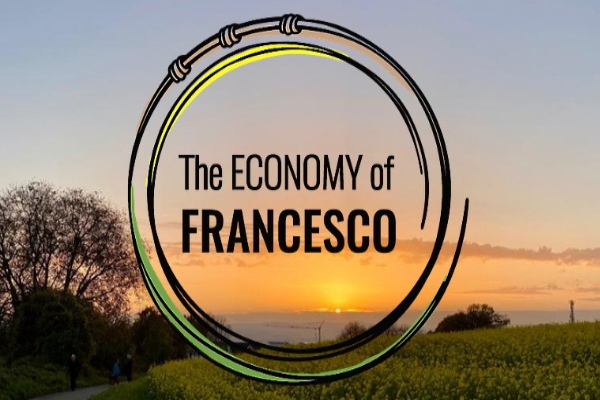Care at the center of a new economy (14 September 2022, Global)

Care at the center of a new economy
The Economy of Francesco is an event taking place in Assisi, Italy from the 22nd to the 24th of September 2022, where young people from all over the world will enter into a dialogue with Pope Francis to start a new economy that is more caring of each other and of nature.
In three videos of a social media campaign titled “Care is work, work is care in the context of The Economy of Francesco”, Marcel Remon, Jesuit director of Centre de Recherche et d’Action Sociales, and Anna Biondi, the Deputy Director Bureau for Worker’s Activities at the International Labour Organization, and Criselle Mejillano, Network and Program Coordinator at the Institute of Environmental Science for Social Change in the Philippines share their points of view, knowledge and what they expect to result from this event.
In his video, the Jesuit director of CERAS, Marcel Remon articulately summarizes what The Economy of Francesco is all about: the aim of having an economy that is more human, social, and respectful towards the environment. Marcel Remon emphasizes that work should lie at the center of this new economy. He advises that this should be by redirecting the meaning and priorities of work. “The objective of work should not be profit and certainly not only profit… work must have a meaning, a certain goal. Before anything work is self-fulfillment and the fulfillment of one’s capacities to be participative and a collaborator in society.”
Work is the way our society is organized by: it gives everyone a purpose and an occupation. When Marcel Remon repeats that “everyone is employable” it means everyone has a role in society, and through this role can help build the new economy. Therefore “work must be inclusive of everyone and must be respectful towards the human dignity of everyone,” so everyone can play a part in society. Remon explains that when people are excluded from work, they cannot fulfill themselves, and that the feeling of being useless to society is one of the worst things a person can experience.
Throughout his video, Marcel illustrates that the world becomes a better place through the work of its people. A dimension of this improvement is the state of the environment as well. The environment is the home that God has given us and “a job that destroys the planet will not help society to live better.” A dignifying job is therefore one that respects nature.
Remon suggests that under the Pope’s new economy, profitability and productivity should not be the measures of our work, because in a productivity-driven economy “we often don’t have the time to do our jobs well.” This necessity of maximizing profit by producing as much as possible while keeping costs minimal, leads to the exploitation of the planet and of people. The economy must change into one that values benevolence over capital. This would allow one the time to do their work well, caring for it, and dignifying themselves by nurturing nature and their relationships as a result.
Marcel Remon points out that the key differentiation is “the economy putting itself to the service of the people, and not the people putting themselves to the service of the economy” and hopes for The Economy of Francesco to facilitate this mindset and economic shift so that work allows us to survive but more importantly to grow.
Anna Biondi, leader for Worker’s Activities at the ILO, summarizes The Economy of Francesco as “the good management of what has been given to us.” She refers to this vision as a socio-ecological change more than of an economic one and makes clear that “the current model is not sustainable, and we need to rethink our way of living and… the world of work in its whole aspect.”
Anna Biondi takes a more direct approach and proclaims that it is not only up to governments and employers to take care of workers, but the responsibility of workers themselves to be part of the change. She recommends workers to join trade unions and reaffirm their working rights. Anna stresses that “socioeconomic issues need enactive participation of workers” and reassures workers that they can take matters into their own hands. Furthermore, she rejects the “paternalistic view” of fixing issues using a top-down strategy, and she calls and empowers all the young people meeting in Assisi to “become enactors of the change” they want to see.
Criselle Mejillano is a Network and Program Coordinator at the Institute of Environmental Science for Social Change in the Philippines and an EoF Youth Delegate in this upcoming event. In her video, Criselle describes how she sees this unique event as one with the opportunity to restore hope in a disillusioned youth. She expects that by bringing young workers from all over the world together and having them exchange in discussion and ideas, the current socio-economic system can be redefined from being one that is totally profit driven to one that cares more for socioecological welfare.
Criselle motivates the EoF participants to not only see this event as a singular experience but rather as “an ongoing movement” to draw inspiration from and share this inspiration with the world which often feels hopeless and unsure if they are making a true impact.
Please click on the following links to watch their testimonies:
Care is work, work is care in the context of The Economy of Francesco: Anna Biondi (ILO) – YouTube

